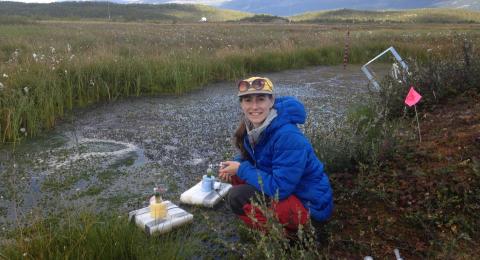The NRESS Ph.D. Program draws on the university's strengths in environmental and earth sciences, life sciences, social sciences, and ethical and policy studies. Our Natural Resources and Environmental Studies Ph.D. students focus on problems dealing with the allocation and distribution of natural resources, policies at the local to global scale, and ethical and societal factors that affect resource management.
WHY PURSUE A PH.D. INEarth and Environmental Sciences Natural Resources and Environmental Studies AT UNH?
The Natural Resources and Earth Systems Science (NRESS) Ph.D. in Natural Resources and Environmental Studies Earth Systems Science(ESS NRES) is an interdepartmental program that draws on the university's strengths in environmental and earth sciences, life sciences, social sciences, and ethical and policy studies to increase our understanding of environmental and natural resource challenges and solutions at the local, regional and global scale. Areas of study include, but are not limited to, ecosystem science, biogeochemical cycling, geochemical systems, atmospheric science, environmental philosophy, forestry, geologic science, hydrology, marine science, oceanography, social science, environmental policy and ethics, environmental education, and multidisciplinary natural resources management.
Program Highlights
The Ph.D. in Natural Resources and Environmental Studies Earth and Environmental Sciences(EES NRES)focuses on problems dealing with the allocation and distribution of natural resources, policies at the local to global scale, and ethical and societal factors that affect resource management. Students typically enter the program with a bachelor's and/or master's degree in economics, environmental conservation, philosophy, political science, or sociology.
Potential Career Areas
- College or university faculty
- Principal Investigator in government agencies
- Research Scientist for nongovernmental environmental organizations
- Policy Advisor for governmental agencies and NGOs
Curriculum & Requirements
The graduate program in Natural Resources and Earth Systems Science (NRESS) is an interdepartmental program offering the Ph.D. degree for interdisciplinary work in areas related to the understanding and management of the environment in the broadest context. Areas of study include, but are not limited to, ecosystem science, biogeochemical cycling, geochemical systems, atmospheric science, environmental philosophy, forestry, geologic science, hydrology, marine science, oceanography, social science, environmental policy and ethics, environmental education, and multidisciplinary natural resources management.
The NRESS Ph.D. in Natural Resources and Environmental Studies (NRES) focuses on problems dealing with the allocation and distribution of natural resources, policies at the local to global scale, and ethical and societal factors that affect resource management. Students typically enter the program with a bachelor's and/or master's degree in economics, environmental conservation, philosophy, political science, or sociology.
Degree Requirements
The requirements of the doctoral program are flexible to accommodate the diverse interests and needs of students. All students in the NRESS program must meet the requirements listed below.
Committees and Coursework
The Ph.D. guidance and dissertation committees must consist of at least five members. The chair must be a member of the NRESS faculty. Three of the five members (including the chair) must be NRESS faculty, and committee members must be from more than one academic department. Students are strongly encouraged to include at least one off-campus member. Off-campus committee members must hold a doctoral (or terminal) degree and be approved by the student's adviser, the NRESS Program, and the Graduate School dean. Students should select the guidance committee in a timely manner, within one year for full-time students and two years for part-time students.
Core Area Course Requirements
All students will take one course in each of four core areas while enrolled in the program: natural sciences, ethics/policy/law, methods, and seminar. Students are also required to take NRES 997, Interdisciplinary Research in Natural Resources and Earth and Environmental Sciences, preferably within the first year of enrollment. Any course used to satisfy the natural sciences, ethics/policy/law, and methods core areas must be a classroom course of at least 3 credits. The seminar course must be interactive and must be at least 1 credit. Independent study courses may not be used to satisfy core requirements. Students must complete a Preliminary Coursework Approval Form, which lists the student's planned coursework, within one year for full-time students and two years for part-time students. A Final Course Approval Form, with signatures from the adviser, committee members, and the NRESS program chair is submitted once the coursework is completed.
Students Entering the Program without a Master's Degree
Students entering the program without a master's degree are expected to complete a minimum of 36 credit hours. There is not a specific credit requirement beyond the required four core courses and NRES 997 for students who have completed a M.S. or M.A. degree in a related field. Students enter the NRESS program with diverse backgrounds and preparation in their desired area of study. Therefore, final credit requirements are determined by the guidance committee and may include additional coursework necessary to enhance the student's selected field of study and/or correct any deficiencies in the student's previous program. Students may apply a maximum of 12 credits of independent study and/or seminar courses to their total course requirement.
Transfer Credits
Graduate-level courses taken prior to admission may be transferred into the program and applied to the total only if they were not taken while matriculated in another degree program, as per Graduate School policy. These courses may not be used to meet the core course requirements. Transfer of credits must be approved by the adviser, the guidance committee, and the Graduate School.
Language Proficiency
Language proficiency may be required at the discretion of the student's adviser/committee. If required, a student will need to show proficiency in one foreign language or one computer language.
Examinations
Each student is required to pass three examinations, each of which has both a written and oral component. Additional preliminary examinations may be administered before the three required exams as the committee deems necessary. Performance on such an exam will determine areas where the student needs additional coursework or could result in the student's removal from the program.
Comprehensive exam (sometimes referred to as the qualifying exam): The student must prepare an extensive written answer to one question from each committee member that covers the basic concepts and factual material deemed essential for the student’s program. Three weeks are allowed for completion of the exam during which time students are expected to work solely on their answers. Answers are expected to be anywhere from 10 – 20 pages per question with extensive literature citations. Completed written answers are submitted to the adviser who then distributes copies to the other committee members for review. Approximately 1 – 2 weeks are allowed for the committee to read the answers, after which time the student gives an oral presentation to the committee. Following the presentation, committee members will ask for clarification of the student’s answers, if necessary. The committee may require a student to repeat part, or all, of the comprehensive exam if the student’s performance is deemed unsatisfactory. This exam should be taken within three years of initiation of graduate study in the program.
Proposal exam: The student must present to the committee a written proposal on the dissertation research topic. Once the proposal is written, the student will complete a public oral presentation of the proposed research, followed by an oral examination by the committee.
Final exam: The student must complete a written Ph.D. dissertation prior to the final exam. Once written, the student is required to complete an oral defense of the dissertation, which will include both a public presentation and oral examination by the committee.
A student may be required to take additional courses following either the comprehensive or proposal exam, or may be removed from the program following failure of any of the required exams. Students are advanced to candidacy after successfully completing the comprehensive exam, proposal exam, and all coursework required by the guidance committee as summarized on the Coursework Approval Form.
The Natural Resources and Environmental Studies (NRES) PhD degree within the Natural Resources and Earth Systems Science PhD Program trains scientists and scholars whose research addresses problems dealing with the allocation and distribution of natural resources, related policies at the local to global scale, and ethical and societal factors that affect resource management. Through interdisciplinary coursework and doctoral research, we train researchers who can independently pursue the process of science and scholarship, effectively apply their research to both solve basic questions in natural resource and environmental studies and apply their work to issues of relevance to society and the environment, especially in this era of global change.
Program Learning Outcomes
- Critically review and cogently synthesize relevant literature, and identify need for new research.
- Draw on previously published work to independently design and execute new experiments or field manipulations or develop models with a high degree of sophistication. The design and execution of an experiment or the building of a model should demonstrate an understanding of good laboratory, field or modeling practices.
- Structure a coherent and convincing academic argument.
- Lead the writing of manuscripts describing their research and its impacts that are suitable for publication in peer-reviewed journals or appropriate professional outlets for their particular sub-discipline, and be able to describe their research in presentations at national meetings of major relevant scientific societies, and at national and international symposia hosted by other professional organizations. The general expectation is that the final dissertation will include three first-authored publications submitted to or accepted in a peer-reviewed journal, or ready for submission.
- Articulate how their research relates to a broader context outside of academia, and how their expertise will be applicable in the execution of complex research problems.
Deadlines
Applications must be completed by the following deadlines in order to be reviewed for admission:
- Fall: May 15 (recommended); August 1 (final; timely processing of applications not guaranteed for late submissions)
- Spring: October 15 (recommended); January 1 (final; timely processing of applications not guaranteed for late submissions)
- Summer: N/A
- Special: N/A
Application fee: $65
Campus: Durham
New England Regional: MA
Accelerated Masters Eligible: No
New Hampshire Residents
Students claiming in-state residency must also submit a Proof of Residence Form. This form is not required to complete your application, but you will need to submit it after you are offered admission, or you will not be able to register for classes.
Transcripts
If you attended UNH or Granite State College (GSC) after September 1, 1991, and have indicated so on your online application, we will retrieve your transcript internally; this includes UNH-Durham, UNH-Manchester, UNH Non-Degree work and GSC.
If you did not attend UNH, or attended prior to September 1, 1991, then you must upload a copy (PDF) of your transcript in the application form. International transcripts must be translated into English.
If admitted, you must then request an official transcript be sent directly to our office from the Registrar's Office of each college/university attended. We accept transcripts both electronically and in hard copy:
- Electronic Transcripts: Please have your institution send the transcript directly to grad.school@unh.edu. Please note that we can only accept copies sent directly from the institution.
- Paper Transcripts: Please send hard copies of transcripts to: UNH Graduate School, Thompson Hall- 105 Main Street, Durham, NH 03824. You may request transcripts be sent to us directly from the institution or you may send them yourself as long as they remain sealed in the original university envelope.
Transcripts from all previous post-secondary institutions must be submitted and applicants must disclose any previous academic or disciplinary sanctions that resulted in their temporary or permanent separation from a previous post-secondary institution. If it is found that previous academic or disciplinary separations were not disclosed, applicants may face denial and admitted students may face dismissal from their academic program.
Letters of recommendation: 3 required
Recommendation letters submitted by relatives or friends, as well as letters older than one year, will not be accepted.
Personal Statement/Essay Questions
A clear, concise statement of the applicant’s relevant past experiences including academics, research, and/or work experience. The statement should also include an expression of interests and an explanation of the student’s goals in pursuing a doctoral degree. Applicants must identify in the application personal statement an NRESS PhD Program Faculty member willing to serve as their graduate advisor.
Statements must be included with your submitted application.
Additional Department Requirements
Applicants must secure a faculty member from the current list of NRESS faculty who will agree to serve as advisor and potentially provide funding for the student’s doctoral studies. Applicants should visit the NRESS program website and review the list of faculty in their area of interest. The applicant should contact potential faculty advisors to discuss their interests to determine if the faculty member(s) would be willing to serve as the student’s advisor before applying to the program.
Important Notes
All applicants are encouraged to contact programs directly to discuss program-specific application questions.
International Applicants
Prospective international students are required to submit TOEFL, IELTS, or equivalent examination scores. English Language Exams may be waived if English is your first language. If you wish to request a waiver, then please visit our Test Scores webpage for more information.
Explore Program Details
Review the timeline for this degree both with and without a master's degree.



